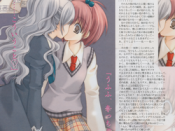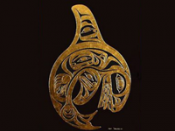Often when a story is read followed by the viewing of the live adaptation, the live version pales in comparison. This is mainly because the imagination can create a far more detailed and vivid picture than will ever be created on screen. In the case of Wheeler's teleplay versus the original short story of Ross's "Ones' a Heifer", it is no different than any other, Ross's work is superior in its plot, characters, and theme.
It is clearly evident that the plot of the short story by Ross is a superior version compared to Wheeler's, however there are similarities in both the teleplay and the short story. A boy goes searching for two lost cows and after searching the whole day he finally spots them. He watches them as they go into a man's stable; he follows, where the hostile Arthur Vickers greets him. He convinces Vickers to let him search the barn and finds nothing but is certain that they are being hidden in a closed stall.
He stays the night and in the morning makes a desperate attempt to break into the closed stall, after a fight with Vickers he returns home. He explains to his uncle and aunt that Vickers has the cows hidden at his place but then he is informed that the cows had returned shortly after he left. It is clear that the two versions of plots have several similarities but it's the differences that make Ross's work superior. In Wheeler's adaptation of the plot she destroys every exciting and mysterious aspect that makes the story so intriguing. When the boy searches the barn and goes to the boarded up stall, he suspects that Vickers is hiding the cows. When he asks what is in there, Vickers replies with a large grin on his face, "Nothing you'd be interested in." Later on when Vickers goes out to bed down the stables, the boy follows him and hears him yell, "Get back in there"æget!" Then when Vickers returns from the barn he brings in with him a bottle that he didn't have before. When these three parts are put together it is obvious what is going on. Judging by Vickers answer to what was in the stall and the way he replies, it can be assumed that it is not something for a child of thirteen years old. Later on when he goes back to the barn he is heard talking to someone. The boy has already searched the barn and found nothing, therefore, the only possible place that someone could have been hiding is in the boarded up stall. Then when Vickers returns from the barn he has a bottle with him, and after showing the audience the bottle they know that the only place that a bottle could have come from is the stall. These three facts lead the audience to one conclusion; and that is, that behind the boarded up walls of the stall Vickers is keeping a still, the person he was talking to is a woman that is inside the stable tending the still so it doesn't blow up, and the bottle he returns with is alcohol. This is all presented in a straightforward way to the audience. That's not intriguing or mysterious; the audience isn't sitting there pondering what is in the not so mysterious stall, because Wheeler tells them. In fact the way that the plot is presented by Wheeler is boring and unimaginative. Ross's work on the other hand is intriguing, mysterious, and complex. The short story has somewhat of an open ending and leaves it up to the reader to come up with the most logical explanation to what is behind the stall. One possibility is that he has killed the girl and has the body hidden in the stall which is suggested when Vickers says "you're not yourself "" you're not sure what you're going to say or do." Another possibility is that he is keeping the girl in the barn and treating her like an animal. This possibility is created when Vickers says, "Just a cow she was" and describes her by saying "this one couldn't even talk." Another possibility is that there is nothing in the stall at all; he's just an isolated senile old man. Now this type of plot is intriguing because it leaves the reader thinking about the story and trying to solve the mystery. Ross's work captures the reader and leaves it up to their imagination to conclude what was really in the stall. It challenges the reader to the point that they are part of the story. Wheelers non-provocative simple plot is definitely inferior to the complicity and imaginative plot of Ross's.
Characters are just one more way that Ross's work is superior to Wheelers. In both versions of the story, it evolves around a young boy and an old man. In both versions the boys character is the same as he caries out his search the same way in both versions and also has the same actions and reactions, however, it's the character of the old man Vickers that makes Ross's work superior. Wheeler's version of Arthur Vickers is once again not nearly as well created as Ross's, as are so many other aspects of her version. Her version of Vickers is a simple one; he is a lonely heartbroken alcoholic. When speaking about women with the boy he says, ""æ you can't win no matter what you do"æ watch for women like her"æ" The complicity of the character is diminished by the fact that his actions were based on the fact that he is drunk. Arthur demonstrates his loneliness when he says, "Never trust a woman"æ she ran off"æ" Vickers is clearly an emotionally lonely man. He is alone in his isolation and in his words he seems to be longing for a woman to share his life with, not the simple-minded woman he has working for him in the barn. He is presented as an obvious alcoholic as he drunkenly attacks the chair in the middle of the night and the fact that he has a still in his barn. He is also an obviously heartbroken man as he speaks of a previous love that had left him. Wheelers version of Vickers is not mysterious and intriguing, the audience knows everything about him. He is supposed to be the scary bad guy, but the way that Wheeler has created the character he's not viewed as fearsome in fact she has created sympathy for him. Ross's version of Vickers on the other hand is extremely complex, in his mysteriousness, possible insanity and representation of the devil. The mystery of Arthur Vickers is created when he doesn't allow the boy in the stall. This makes the reader wonder what dark secret Vickers has to hide. The mystery continues when Vickers would hear a noise and would "sit rigid for a moment with his eyes fixed on the window." This makes the reader wonder what Vickers is so afraid of. His possible insanity is obvious when the boy witnesses him slide "his hand an inch or two along the table "æ as if he were reaching for a weapon." The boy continued to watch as "he hurled the checkers with such vicious fury "æ across the room." Vickers is attacking the chair across from him "as if his invisible partner were an enemy." This exploits the possibility of Vickers insanity. The way that Ross presents Vickers to the reader is of representation of the devil. This is illustrated when the boy notices "there was no light in the window." Which shows he lives in darkness. He also wore a sinister looking "long black overcoat nearly to his feet." The boy describes him as having "a dark and evil face." Vickers lives in the dark wears a long black coat and has an evil face. All these descriptions add to the representation of the devil and in turn create a fearsome character for the reader to view as evil. This adds a new depth to the character apposed to Wheelers sad lonely old man. Ross's Vickers is exciting and mysterious. Wheelers has already destroyed the mystery of Arthur Vickers by letting the viewers know what Vickers is hiding; where as Ross's version is mysterious and intriguing. Wheeler's version of Vickers is discredited as being insane because his actions are caused by the influence of alcohol. Wheeler's version of Vickers is a simple single dimensional character where as Ross's is complex and multi dimensional.
In both the teleplay and the short story there are two themes, that of isolation and of coming of age. In both versions Vickers is isolated which determines the course of his actions. In one version his isolation leads to his alcoholism and in the other it leads to his insanity. However in Wheelers version she destroys the coming of age theme. The boy she names, "ÃÂPeter McDermitt' leaves the gate open and then has to go searching for the cows. This fact is clearly shown when Peter repeatedly hears his uncle's voice lecturing him that they "can't afford to lose those cows." Then at the end of the teleplay the uncle tells Peter, "Don't forget to close the gate" which was what caused the problem in the first place. Peter had to get the cows because of a childish mistake that he had made. It's not a coming of age; he's simply trying to fix his wrong. This is not complex or intriguing. It's a common error that a young person would make. The boy lost the cows and now he has to go get them, so what, who cares? Not the audience; it doesn't say anything to the audience; it doesn't reach out and relate to them. The bottom line is that Wheeler's theme is boring and unimaginative, and it pales in comparison to Ross's. In Ross's version he gives the no name during the course of the short story. Ross develops the theme of coming of age when the boy informs, "My uncle was laid up that winter with sciatica," and continues to say that "when the blizzard stopped and two of the yearlings hadn't come home with the other cattle, Aunt Ellen said I'd better saddle Tim and start out looking got them." He then shows the reader his innocence and lack of experience when he says, "I was thirteen and had never been away like that all night before." Ross doesn't give the boy a name so that the reader can relate to him. He represents the common man and how everybody had to be tested in their individual coming of age. His uncle is sick so he can't go search for the lost cows. The faith of the farm relies on this boy to go and find the cows; it's a test of his manhood. Now the theme has created feeling for the boy, he's not just an individual correcting his mistakes, he is everybody in their growth to becoming an adult. As Ross's work relates to his reader the theme is far superior to Wheeler's once again unimaginative work.
It is true that the screenplay of Wheeler's has many similarities with Ross's short story, but the differences put the two versions on totally different levels. Ross's version is the original and is clearly a step above Wheelers' version. It's difficult to see how one can even think to improve by recreating such an untouchable piece of work. Ross makes his work superior in his plot, his characters, his theme and virtually every other aspect that differs between the two versions.





